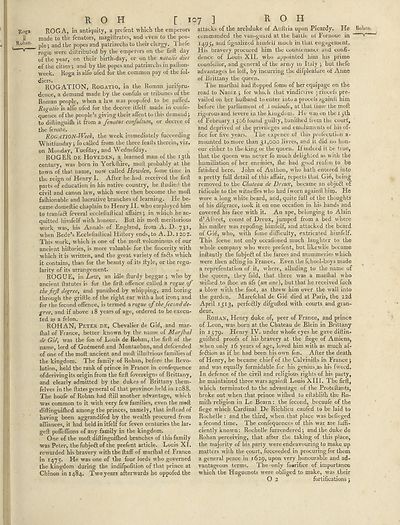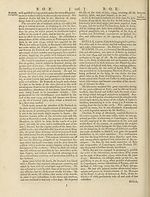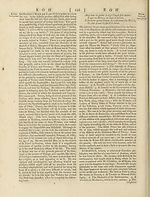Encyclopaedia Britannica, or, a Dictionary of arts, sciences, and miscellaneous literature : enlarged and improved. Illustrated with nearly six hundred engravings > Volume 18, RHI-SCR
(115) Page 107
Download files
Complete book:
Individual page:
Thumbnail gallery: Grid view | List view

R O H [ 107 ] R O H
Roga ROGA, in antiquity, a prefent which the emperors
\\ made to the fenators, magiftrates, and even to the peo-
Rohan- pie; and the popes and patriarchs to their clergy. Thefe
rogaj vvere diltributed by the emperors on the firlt day
of the year, on their birth-day, or on the natalis dies
©f the cities; and by the popes and patriarchs in palhon-
week. Koga is alfo ufed for the common pay of the fol-
diers.
ROGATION, Rogatio, in the Roman jurilpru-
dence, a demand made by the confuls or tribunes of the
Roman people, when a law was propofed to be palled.
Rogatio is alfo ufed for the decree itfelf made in confe-
quence of the people’s giving their affent to this demand j
to diftinguilh it from a fenatus confultum, or decree of
the fenate.
ROGATION-Week, the week immediately fucceeding
Whitfunday j fo called from the three featls therein, viz.
on Monday, Tuefday, and Wednefday.
ROGER DE HoVEDEN, a learned man of the 13th
century, was born in Yorklhire, moll probably at the
town of that name, now called Howden, fome time in
the reign of Henry I. After he had received the firft
parts of education in his native country, he ftudied the
civil and canon law, which were then become the moll
falhionable and lucrative branches of learning. He be¬
came domeftic chaplain to Henry II. who employed him
to tranfad! feveral ecclefiaftical affairs j in which he ac¬
quitted himfelf with honour. But his moft meritorious
work was, his Annals of England, from A. D. 731,
when Bede’s Ecclefiaftical Hiftory ends, to A. D. 120 2.
This work, which is one of the moft voluminous of our
ancient hiftories, is more valuable for the fincerity with
which it is written, and the great variety of fads which
it contains, than for the beauty of its ftyle, or the regu¬
larity of its arrangement.
ROGUE, in Law, an idle fturdy beggar j who by
ancient ftatutes is for the firft offence called n rogue of
the firjl degree, and punilhed by whipping, and boring
through the griftle of the right ear with a hot iron; and
for the fecond offence, is termed a rogue of the fecond de¬
gree, and if above 18 years of age, ordered to be execu¬
ted a.s a felon.
ROHAN, Peter DE, Chevalier de Gie, and mar-
Ihal of France, better known by the name of Marfhal
de Gie, was the fon of Louis de Rohan, the firft of the
name, lord of Guemene and Montauban, and defeended
of one of the moft ancient and moft illuftrious families of
the kingdom. The family of Rohan, before the Revo¬
lution, held the rank of prince in France in confequence
of deriving its origin from the firft fovereigns of Brittany,
and clearly admitted by the dukes of Brittany them-
felves in the ftates general of that province held in 1088.
The houfe of Rohan had ftill another advantage, which
was common to it with very few families, even the mart
diftinguilhed among the princes, namely, that inftead of
having been aggrandifed by the wealth procured from
alliances, it had held in itfelf for feven centuries the lar-
geft poffeflions of any family in the kingdom.
One of the moft diftinguilhed branches of this family
was Peter, the fubjeft of the prefent article. Louis XL
rewarded his bravery with the ftaff of marlhal ot France
in 1475. He was one of the four lords who governed
the kingdom during the indifpofition of that prince at
Chinon in 1484. Two years afterwards he oppofed the
attacks of the archduke of Auftria upon Picardy. He Rohan,
commanded the van-guard at the battle ot Fornoue in "' " y~~‘
1493, and lignalized huntell much in that engagement.
His bravery procured him the countenance and confi¬
dence of Louis XII. who appointed him his prime
counfellor, and general of the army in Italy ; but thefe
advantages he loft, by incurring the difpleaiure ot Anne
of Brittany the queen.
The marilral had Hopped fome of her equipage on the
road to Nantz ; for which that vindictive ; rincels pre¬
vailed on her hulband to enter into a proceis againli him
before the parliament ot 1 ouloufe, at that time the moft:
rigorous and tevere in the kingdom. He was on thei jth
of February 1506 found guilty, banilhed from the court,
and deprived ot the privileges and emoluments ot his of¬
fice for five years. The expence of this proiecutiun a-
mounted to more than 31,000 livres, and it did no hon¬
our either to the king or the queen. If indeed it be true,
that the queen was never fo much delighted as with the
humiliation of her enemies, fhe had good reafon to be
fatisfied here. John of Authon, who hath entered into
a pretty full detail of this affair, reports that Gie, being
removed to the Chateau de Dreux, became an object of
ridicule to the witneffes who had fworn againft hirp. He
wore a long white beard, and, quite lull ol the thoughts
of his difgrace, took it on one occafion in his hands and
covered his face with it. An ape, belonging to Alain
d’Albret, count of Dreux, jumped from a bed where
his mafter was repofing himfelf, and attacked the beard
of Gie, who, with fome difficulty, extricated himfelf.
This feene not only occafioned much laughter to the
whole company who were prefent, but likewife became
inftantly the fubjeft of the farces and mummeries which
were then acting in France. Even the Ichool-boys made
a reprefentation of it, where, alluding to the name of
the queen, they faid, that there was a marlhal who
wiffied to (hoe an afs («« ane}, but that he received fuch
a blow with the foot, as threw him over the wall into
the garden. Marefchal de Gie died at Paris, the 22d
April 1513, perfectly difgufted with courts and gran¬
deur.
Rohan, Henry duke of, peer of France, and prince
of Leon, was born at the Chateau de Blein in Brittany
in 1579. Henry IV. under vvhofe eyes he gave diftin-
guilhed proofs of his bravery at the fiege of Amiens,
when only 16 years of age, loved him with as much af¬
fection as if he had been his own fon. After the death
of Henry, he became chief of the Calvinifts in France;
and was equally formidable for his genius.as his fword.
In defence of the civil and religious rights of his party,
he maintained three wars againft Louis XIII. The firft,
which terminated to the advantage of the Proteftants,
broke out when that prince wiflied to eftablilh the Ro-
miffi religion in Le Bearn : the fecond, becaufe of the
fiege which Cardinal De Richlieu caufed to be laid to
Rochelle : and the third, when that place was befieged
a fecond time. The confequences of this war are luffi-
ciently known: Rochelle furrendered; and the duke de
Rohan perceiving, that after the taking of this place,
the majority of his party were endeavouring to make up
matters with the court, fucceeded in procuring for them
a general peace in 1629, upon very honourable and ad¬
vantageous terms. The only fa«rifice of importance
which the Huguenots were obliged to make, was their
O 2 fortifications ;
Roga ROGA, in antiquity, a prefent which the emperors
\\ made to the fenators, magiftrates, and even to the peo-
Rohan- pie; and the popes and patriarchs to their clergy. Thefe
rogaj vvere diltributed by the emperors on the firlt day
of the year, on their birth-day, or on the natalis dies
©f the cities; and by the popes and patriarchs in palhon-
week. Koga is alfo ufed for the common pay of the fol-
diers.
ROGATION, Rogatio, in the Roman jurilpru-
dence, a demand made by the confuls or tribunes of the
Roman people, when a law was propofed to be palled.
Rogatio is alfo ufed for the decree itfelf made in confe-
quence of the people’s giving their affent to this demand j
to diftinguilh it from a fenatus confultum, or decree of
the fenate.
ROGATION-Week, the week immediately fucceeding
Whitfunday j fo called from the three featls therein, viz.
on Monday, Tuefday, and Wednefday.
ROGER DE HoVEDEN, a learned man of the 13th
century, was born in Yorklhire, moll probably at the
town of that name, now called Howden, fome time in
the reign of Henry I. After he had received the firft
parts of education in his native country, he ftudied the
civil and canon law, which were then become the moll
falhionable and lucrative branches of learning. He be¬
came domeftic chaplain to Henry II. who employed him
to tranfad! feveral ecclefiaftical affairs j in which he ac¬
quitted himfelf with honour. But his moft meritorious
work was, his Annals of England, from A. D. 731,
when Bede’s Ecclefiaftical Hiftory ends, to A. D. 120 2.
This work, which is one of the moft voluminous of our
ancient hiftories, is more valuable for the fincerity with
which it is written, and the great variety of fads which
it contains, than for the beauty of its ftyle, or the regu¬
larity of its arrangement.
ROGUE, in Law, an idle fturdy beggar j who by
ancient ftatutes is for the firft offence called n rogue of
the firjl degree, and punilhed by whipping, and boring
through the griftle of the right ear with a hot iron; and
for the fecond offence, is termed a rogue of the fecond de¬
gree, and if above 18 years of age, ordered to be execu¬
ted a.s a felon.
ROHAN, Peter DE, Chevalier de Gie, and mar-
Ihal of France, better known by the name of Marfhal
de Gie, was the fon of Louis de Rohan, the firft of the
name, lord of Guemene and Montauban, and defeended
of one of the moft ancient and moft illuftrious families of
the kingdom. The family of Rohan, before the Revo¬
lution, held the rank of prince in France in confequence
of deriving its origin from the firft fovereigns of Brittany,
and clearly admitted by the dukes of Brittany them-
felves in the ftates general of that province held in 1088.
The houfe of Rohan had ftill another advantage, which
was common to it with very few families, even the mart
diftinguilhed among the princes, namely, that inftead of
having been aggrandifed by the wealth procured from
alliances, it had held in itfelf for feven centuries the lar-
geft poffeflions of any family in the kingdom.
One of the moft diftinguilhed branches of this family
was Peter, the fubjeft of the prefent article. Louis XL
rewarded his bravery with the ftaff of marlhal ot France
in 1475. He was one of the four lords who governed
the kingdom during the indifpofition of that prince at
Chinon in 1484. Two years afterwards he oppofed the
attacks of the archduke of Auftria upon Picardy. He Rohan,
commanded the van-guard at the battle ot Fornoue in "' " y~~‘
1493, and lignalized huntell much in that engagement.
His bravery procured him the countenance and confi¬
dence of Louis XII. who appointed him his prime
counfellor, and general of the army in Italy ; but thefe
advantages he loft, by incurring the difpleaiure ot Anne
of Brittany the queen.
The marilral had Hopped fome of her equipage on the
road to Nantz ; for which that vindictive ; rincels pre¬
vailed on her hulband to enter into a proceis againli him
before the parliament ot 1 ouloufe, at that time the moft:
rigorous and tevere in the kingdom. He was on thei jth
of February 1506 found guilty, banilhed from the court,
and deprived ot the privileges and emoluments ot his of¬
fice for five years. The expence of this proiecutiun a-
mounted to more than 31,000 livres, and it did no hon¬
our either to the king or the queen. If indeed it be true,
that the queen was never fo much delighted as with the
humiliation of her enemies, fhe had good reafon to be
fatisfied here. John of Authon, who hath entered into
a pretty full detail of this affair, reports that Gie, being
removed to the Chateau de Dreux, became an object of
ridicule to the witneffes who had fworn againft hirp. He
wore a long white beard, and, quite lull ol the thoughts
of his difgrace, took it on one occafion in his hands and
covered his face with it. An ape, belonging to Alain
d’Albret, count of Dreux, jumped from a bed where
his mafter was repofing himfelf, and attacked the beard
of Gie, who, with fome difficulty, extricated himfelf.
This feene not only occafioned much laughter to the
whole company who were prefent, but likewife became
inftantly the fubjeft of the farces and mummeries which
were then acting in France. Even the Ichool-boys made
a reprefentation of it, where, alluding to the name of
the queen, they faid, that there was a marlhal who
wiffied to (hoe an afs («« ane}, but that he received fuch
a blow with the foot, as threw him over the wall into
the garden. Marefchal de Gie died at Paris, the 22d
April 1513, perfectly difgufted with courts and gran¬
deur.
Rohan, Henry duke of, peer of France, and prince
of Leon, was born at the Chateau de Blein in Brittany
in 1579. Henry IV. under vvhofe eyes he gave diftin-
guilhed proofs of his bravery at the fiege of Amiens,
when only 16 years of age, loved him with as much af¬
fection as if he had been his own fon. After the death
of Henry, he became chief of the Calvinifts in France;
and was equally formidable for his genius.as his fword.
In defence of the civil and religious rights of his party,
he maintained three wars againft Louis XIII. The firft,
which terminated to the advantage of the Proteftants,
broke out when that prince wiflied to eftablilh the Ro-
miffi religion in Le Bearn : the fecond, becaufe of the
fiege which Cardinal De Richlieu caufed to be laid to
Rochelle : and the third, when that place was befieged
a fecond time. The confequences of this war are luffi-
ciently known: Rochelle furrendered; and the duke de
Rohan perceiving, that after the taking of this place,
the majority of his party were endeavouring to make up
matters with the court, fucceeded in procuring for them
a general peace in 1629, upon very honourable and ad¬
vantageous terms. The only fa«rifice of importance
which the Huguenots were obliged to make, was their
O 2 fortifications ;
Set display mode to:
![]() Universal Viewer |
Universal Viewer | ![]() Mirador |
Large image | Transcription
Mirador |
Large image | Transcription
Images and transcriptions on this page, including medium image downloads, may be used under the Creative Commons Attribution 4.0 International Licence unless otherwise stated. ![]()
| Permanent URL | https://digital.nls.uk/193020202 |
|---|
| Attribution and copyright: |
|
|---|
| Description | Ten editions of 'Encyclopaedia Britannica', issued from 1768-1903, in 231 volumes. Originally issued in 100 weekly parts (3 volumes) between 1768 and 1771 by publishers: Colin Macfarquhar and Andrew Bell (Edinburgh); editor: William Smellie: engraver: Andrew Bell. Expanded editions in the 19th century featured more volumes and contributions from leading experts in their fields. Managed and published in Edinburgh up to the 9th edition (25 volumes, from 1875-1889); the 10th edition (1902-1903) re-issued the 9th edition, with 11 supplementary volumes. |
|---|---|
| Additional NLS resources: |
|

